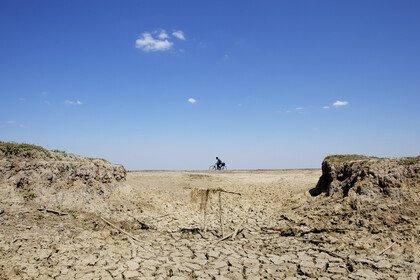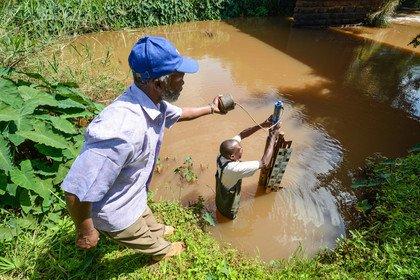
These research projects are finding ways to adapt to a heating planet
Dr Maimela's research is supported as part of Wellcome's £17.5 million funding to research investigating ways we can adapt to rising global temperatures.
Dr Gloria Maimela, Director of Climate and Health at Wits RHI in South Africa, outlines the impacts of excessive heat on pregnant women – and shares some of the ways research can provide solutions.

SOPA Images / Getty Images

Director of Climate and Health, Wits RHI in South Africa

Director of Climate and Health, Wits RHI in South Africa
A few years ago, I came across some research done in Kenya where women reported that when it's hot, they can't even breastfeed their children.
As a medical doctor, my instinct is to save lives. So, when you read something like that and understand the impact it has, you want to do something to change it.
More studies have come out since – and even more are still in the pipeline – showing that excessive heat has a direct impact on pregnancy. Gestational diabetes, pregnancy-induced hypertension, low birth weight, prematurity, prolonged labour and even stillbirth have all been linked to when pregnant women are exposed to extreme heat.
I'm the principal investigator on a research study working to build a body of evidence on adaptation interventions that reduce the impact of heat on pregnant women and infants. And when I say adaptation, I mean we want to find better ways for women to cope with the excessive heat that we are seeing as a result of climate change in South Africa.
At an individual, household and community level, it’s about behavioural change and increasing awareness of the dangers of excessive heat. Effective interventions could be as simple as drinking more water, planting trees or painting a white roof.
Then we need to influence policy at a national and international level. For example, there aren't any maternal health indicators or existing surveillance systems to protect pregnant women from the impact of heat. So, we’re also generating evidence on early warning systems to be able to inform women when there is a risk to their health because of heat exposure.
Finally, we need to stimulate further research in the area. We are laying the foundation on which many other questions can then be explored. I'm particularly interested in delving deeper into the biological pathways – for example, what exactly is it about heat that results in prematurity?

Dr Maimela's research is supported as part of Wellcome's £17.5 million funding to research investigating ways we can adapt to rising global temperatures.
We want to be able to impart some knowledge to the next generation; to say listen, if you don't look after the environment, if you don't change, these are the things that you will see. We’ve given you the evidence; now you need to go and use it.
The African continent is disproportionately affected by climate change and yet we are not responsible for most of the greenhouse emissions causing global warming.
We need to attract more research funding to implement projects like ours which could help vulnerable populations adapt to the impact of global warming.

Director of Climate and Health, Wits RHI in South Africa
Dr Gloria Maimela is the Director of Climate and Health at Wits RHI. She provides oversight on various donor funded Climate Change and Health projects at Wits RHI. These projects aim to develop innovative solutions to mitigate the impact of climate change on the health of vulnerable populations including pregnant women, infants and healthcare workers in Southern Africa.
Prior to this, Dr Maimela provided strategic oversight and technical input to over 1000 Wits RHI staff for the implementation of PEPFAR-funded HIV and TB programs across multiple districts in South Africa. She currently plays a leading role in the design and implementation of innovative climate change and health projects within Wits RHI. She is the Hub Administrator and co-principal Investigator of the NIH-funded Heat and Health in Africa Transdisciplinary (HE2AT) Center. She is also a local PI and co-PI of the European Union and Wellcome Trust-funded climate change and health projects that aim to design and evaluate the effectiveness of simple and complex adaptation and mitigation interventions to reduce the impact of heat exposure in pregnant women, infants and healthcare workers.
She is also a member of the Climate and Health Africa Network for Collaboration and Engagement (CHANCE) Network, and she recently chaired the 11th South African AIDS Conference and used this platform to raise awareness on the impact of climate change on health.

